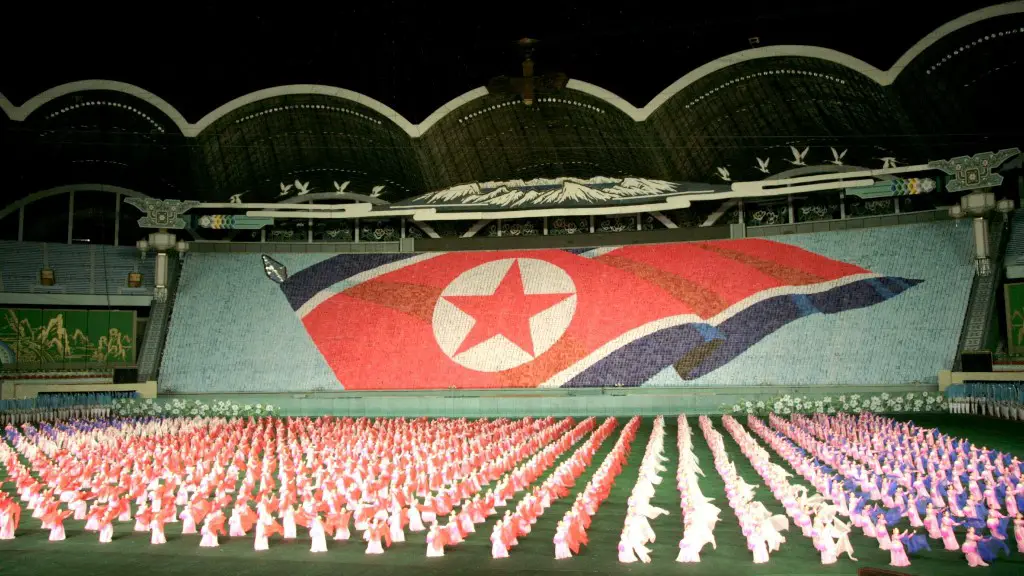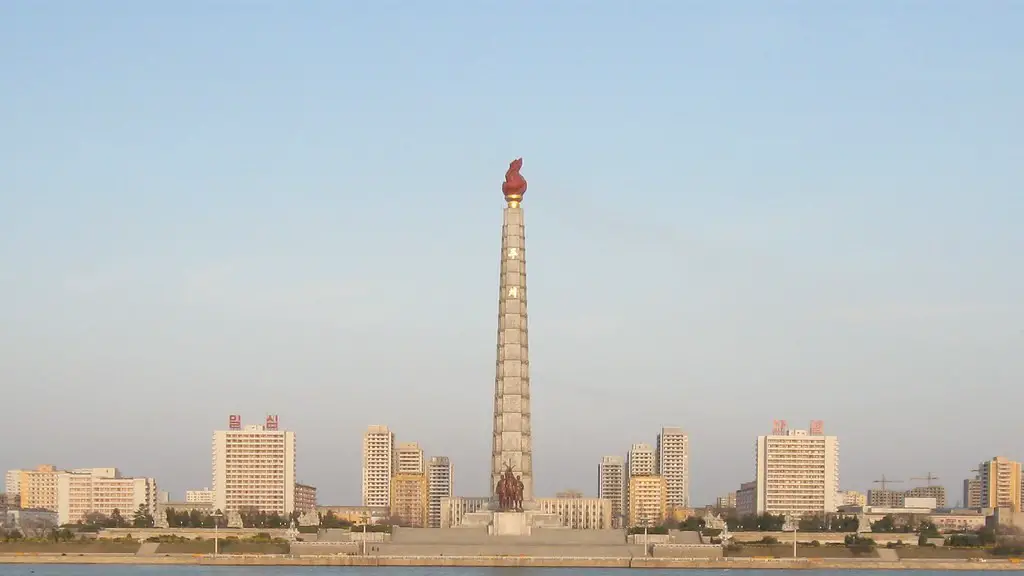Why Are America And North Korea Fighting?
America and North Korea have been engaged in a long, strenuous battle since the Cold War. Each country perceives the other as a potential threat— politically, economically, and militarily. While disputes between the two nations may have seemed to cool down recently, the underlying causes remain. This article dissects the decades-long conflict between the United States and North Korea, delving deep into its motivations and consequences.
As the Cold War ended, North Korea and the United States clashed over a variety of issues. Initially, North Korea saw the US as a major impediment to its development, as the US economic blockade could seriously affect its economic growth. The US-North Korea summit in 1994 failed to yield a resolution, and the two countries remained deeply divided. As a result, North Korea’s relationship with the US has grown ever more strained.
The US and North Korea have different geopolitical ambitions. The US seeks to project its strength across the world, and to maintain its status as the world’s number one superpower. On the other hand, North Korea is intent on preserving its autonomy and its leader’s oppressive rule. This has led to a series of acrimonious dealings between the two sides, as the US has sought to use economic and strategic pressure to bring North Korea to the bargaining table. North Korea has been resistant to these attempts, which have only further deteriorated ties.
An important factor in the conflict between America and North Korea is the country’s pursuit of nuclear weapons. North Korea has made it clear that it will continue to pursue nuclear capabilities, and has not been dissuaded by US warnings. This has only served to heighten tensions, as the US fears that North Korea’s development of nuclear weapons could destabilize the region.
China and Russia both have a stake in the conflict. China is North Korea’s closest ally, and has sought to block stringent economic sanctions against Pyongyang. Russia has previously provided North Korea with economic and military assistance, and continues to use North Korea as a pawn in its quest to extend its influence in the region. These third-party players have only added to the complexity of the situation.
The human cost of the conflict has been devastating. North Korean citizens have been enduring a harsh, oppressive regime for years, with dire consequences for the country’s well-being. The recent strain on the US-North Korea relations has only exacerbated the situation, with relations between the two countries becoming increasingly hostile. The impact of the conflict has been felt well beyond their borders, as economic sanctions and military action have touched many lives.
Rising Tensions
The diplomatic crisis between the US and North Korea has only intensified in recent years. President Donald Trump has taken a hardline stance against North Korea, threatening military action and further economic sanctions in an effort to cut off funding for its nuclear program. North Korea, for its part, has responded with belligerence, threatening to launch a nuclear attack in retaliation.
Escalations in the crisis have been met with international alarm. The United Nations Security Council voted to pass a series of harsh sanctions against North Korea, in an effort to quell the mounting tensions. However, North Korea has remained defiant, and the US has made it clear that it will take a tough stance against Pyongyang’s activities. This has only increased the animosity between the two countries, and further inflamed the situation.
The volatile situation has had a ripple effect on the international community. Fears of a regional conflict have been raised, and many countries are on alert. Additionally, the economic consequences of the conflict have been felt around the world, particularly the Asia-Pacific region. This has prompted the United Nations to intervene, calling for restraint from both sides and urging them to de-escalate the situation.
Economic Impact
The economic impact of the US-North Korea conflict is far-reaching and has been felt in both countries. For North Korea, the economic sanctions have had a crippling impact, as the country’s economy relies heavily on external trade. North Korean companies have been hit hard, as the country’s industry struggles to keep up with the sanctions. This has only served to deepen the country’s dire economic situation.
The US, meanwhile, has also seen its economy suffer due to the conflict. Its reliance on the Asia-Pacific market has been significantly diminished, as US companies have been forced to limit their presence in North Korea. The US government has responded by offering incentives to US trade partners, in an effort to mitigate the impact of the conflict.
The conflict between the US and North Korea has had a significant impact on global markets. The conflict has caused stock prices to plunge and investors to become wary of investing in the region. This, in turn, has had a ripple effect on other markets, as investors seek more stable investments and economies. This will have long-term consequences for both countries, as the economic fallout is felt across the globe.
International Diplomacy
The US and North Korea have both sought to use international diplomacy as a tool to bring about a resolution. North Korea’s leader, Kim Jong Un, has met with US officials on several occasions in an effort to find common ground. These talks have yielded few results, as the US and North Korea remain far apart on the issues. However, the US has indicated that it is willing to sit down with North Korea and discuss a path forward.
Other nations have also sought to mediate the conflict. China has sought to use its sway with North Korea to act as a peace-broker and encourage talks between the two countries. Meanwhile, Russia has also offered to act as a mediator and has sought to de-escalate the situation. These efforts, however, have yet to yield any tangible results.
The conflict between America and North Korea is complicated and multifaceted. While the two countries remain divided on many issues, there is evidence that systematic diplomacy may be the only viable route towards peace. Whether this will come to pass remains to be seen, but it is clear that the economic upheavals created by the conflict will have far-reaching consequences for both sides.
The Future of the Conflict
The future of the conflict between America and North Korea is uncertain. It is clear that neither side is willing to back down, and the high stakes have raised the likelihood of a full-blown conflict. While the international community has urged restraint, they have been unable to reach a resolution. Moving forward, it is likely that relations between the two countries will remain tense.
The US remains committed to finding a diplomatic solution to the conflict, but this will be no easy task. North Korea has little reason to cooperate and its reluctance to compromise may lead to a prolonging of the conflict. This has raised fears of a regional conflict, as the US and North Korea both have the capacity to deploy devastating military force.
Ultimately, the US and North Korea remain locked in a tense standoff that has had devastating consequences for the region and beyond. The world has watched in anticipation as the two sides have engaged in a long-term battle, and the future is uncertain. Whether they will be able to reach a peaceful resolution remains to be seen.
Global Reactions
The escalating conflict between the US and North Korea has been met with a great deal of international consternation. The international community has responded to the tensions with calls for restraint, and has sought to bring about a peaceful resolution to the crisis.
International organizations have also been deeply concerned about the situation. The United Nations Security Council has passed a series of economic sanctions against North Korea in a bid to de-escalate the situation, but this has yet to bring about any tangible results. The UN General Assembly has adopted resolutions urging the two sides to come to the negotiating table, and has called for an end to the hostilities.
Meanwhile, the increasing tension has weakened the Asia-Pacific region’s ties with the US. Many countries have sought to reduce their reliance on US-led trade agreements, as they fear that the conflict may further destabilize the global economy. China and Russia, meanwhile, have sought to use their influence on North Korea to reduce the tension, as they look to protect their interests in the region.
The US-North Korea conflict has had a profound impact on the global political landscape. Countries across the world have been caught up in the growing tensions, and have sought to find a peaceful resolution, but with little success so far. The future of the conflict remains uncertain, but one thing is clear – it will have far-reaching consequences for the world.





